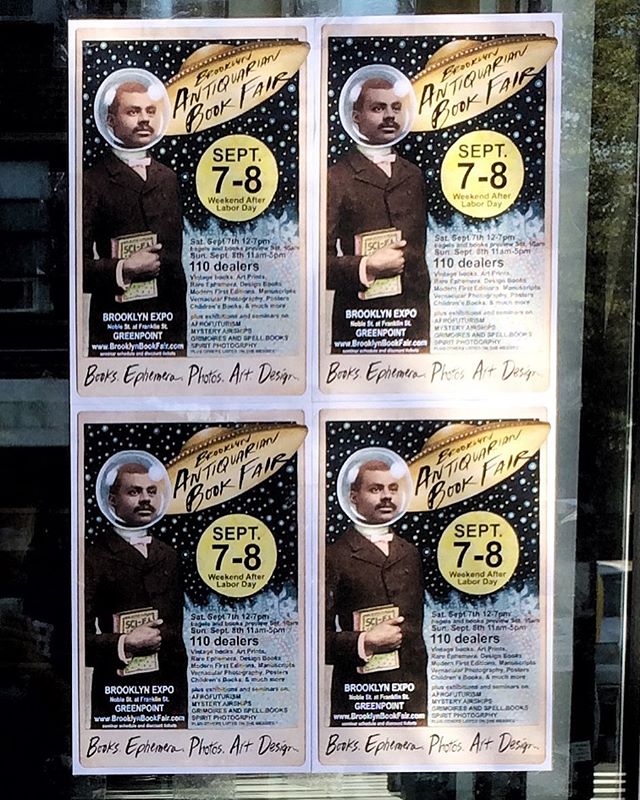
The 6th edition of the Brooklyn Antiquarian Book Fair will be held this weekend (September 7 and 8) at the Brooklyn Expo Center in Greenpoint. The volumes that will be on sale from a host of dealers are only one part of the festivities, however: the fair will include everything from a seminar on collecting occult books to an art show exploring the history of Afrofuturism. We talked with the festival’s Creative Director, Brian Chidester, to learn more—and to get a sense of what attendees might expect.
This edition of the Brooklyn Antiquarian Book Fair will be its sixth in Greenpoint. What have your goals been for this iteration of the festival?
To outdo the last one. To raise the bar. And to tap into the current energy of counter-cultures in NYC and beyond. Things are deeply polarized right now, politically, and there’s massive mistrust of institutions and fear about things like gun violence, xenophobia, global warming, surveillance, data collection, opioid addiction and other healthcare matters, etc. I tried to develop the programming for these shows as more than just escapism. I wanted people to feel like they could come to the shows and tap into alternate modes of spirituality, politics, and art. Despite what CNN and The View tell us each day, the status-quo is not working, and new creative solutions to problems are required.
One of this year’s seminars will focus on collecting grimoires. How much overlap have you found there is between book collectors and occult enthusiasts?
Occult enthusiasts can find a lot of superficial information or images on Wikipedia or Pinterest. But the real esoteric stuff is still to be found in old manuscripts and antiquarian books. Contemporary historians are also increasingly aware that research is more than just fitting things into neat categories now. It’s about the spiritual journey of going down rabbit holes and opening up possibilities.
This year, an appraisal event will serve as a scholarship fundraiser for the Rare Books School at the University of Virginia. How have you found most new collectors or sellers have gotten into this world?
The antidote to living in a virtual reality, or an institutional reality of pre-packaged history, or a corporate reality of consumer goods made in China, is to find information that has been discarded, or lost, or tucked away in dusty antique stores or old bookstores or flea markets. There’s a million ways that young people can get into collecting vintage things; the antiquarian fairs are just a small part of that. But Marvin Getman, the promoter of the Brooklyn Antiquarian Book Fair, is especially good at keeping the content fresh. It’s like Field of Dreams. If you build it they will come.
The two art exhibits you’re holding as part of the book fair focus on Afrofuturism and Charles A.A. Dellschau. What led to these as the focal points for this year?
Both reflect non-mainstream perspectives. I remember as a teen listening to some old Richard Pryor albums from the 1970s and hearing him observe that there were no black people in the current science fiction movies he was watching and that “white people must not be expecting us to live.” That got me curious. How DO people of African descent see themselves in the future? And I’d seen some exhibitions of Afrofuturism in the last ten years; but none of them were historical. They all featured contemporary artists only. Being a historian and a curator, I felt compelled to look at a larger field of black fantasy and futurama, and that’s what the Afrofuturism exhibition does. It presents a hundred years of black speculative fiction in visual art, books, films, comics, and album covers.
The Dellschau exhibition explores an untapped area in the oeuvre of this well-known visionary artist; namely his later work and how it funneled the early 20th century fascination with flight technology into a kind of mythological world. His manuscripts are more than just a compendium of flying machines. They constitute a whole artistic world of heroes, events, tragedies, and supernatural elements. When you see them collected and presented in sequence you get swept up in his vision and transported to another reality.
Over the time that you’ve held the book fair, have you noticed any changes in terms of the attendees or sellers?
I don’t know about other antiquarian fairs per se but the demographic for the Brooklyn Fair is definitely getting younger. The tried and true collectors still come and they usually have more precise collections they are working on and more money to spend. The younger demographic are still getting their feet on the ground, figuring out what they like and want to collect, and have less disposable income usually. But what they look for is very different. Traditional collectors go for mint condition 1st editions of classics like Ulysses or Moby Dick, whereas the newer collectors are a bit less predictable, they don’t really care about the institutional canon. They actually don’t trust it; or trust academia in general. What they’re looking for are visually surreal objects, oddities, and things that present lost perspectives or lost voices from history. It’s been great seeing this new direction develop as a response to what is happening in our times.
Photo: Brooklyn Antiquarian Book Fair/Instagram
Follow Vol. 1 Brooklyn on Twitter, Facebook, and sign up for our mailing list.
